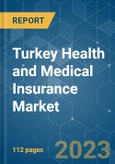To support the Universal Health Insurance (UHI) initiative, Turkey must focus on the private health insurance sector, which presently accounts for only 2% of the overall health insurance coverage. To achieve this feat, it should aim at diverting government funds toward the healthcare needs of the vulnerable sections.
The Turkish government must provide all the required legal impetus for the sellers and users of health insurance. With policies that are simplified and explained in detail to the buyers of the health insurance policies, a growing number of Turkish people may come forward to get health coverage, thus increasing the demand for private health insurers, leading to double-digit growth in the market.
During the COVID-19 pandemic, healthcare systems are under extreme pressure. While the global pandemic had an impact on many industries, COVID-19 has surged growth in the Turkey Health and Medical Insurance sector. The health and medical insurance industry of Turkey has demonstrated its importance by offering COVID-19-specific health insurance plans and providing assistance to policyholders. Health insurance plan sales increased amid COVID-19, which has been beneficial to both customers and insurers. Health insurance providers with exclusive facilities and benefits, on the other hand, are in higher demand.
Turkey Health & Medical Insurance Market Trends
Private Health Insurance Picking Up Among Turkish Population to Meet the Growing Health Needs
Top-up insurance is the fastest-growing portion of the private medical insurance market in Turkey. According to the Insurance Association of Turkey, in 2021, health premiums increased by 22.9% compared to the previous year. The advent of complementary health insurance in this area indicates that the demand for private health insurance may increase in the coming years and that there may be more growth in this area.Since the inception of complementary health insurance in 2013, there has been a significant rise in health insurance coverage, owing to the availability of qualified and high standards of healthcare in private health institutions.
Private insurance companies provide two main types of coverage, namely in-patient coverage and out-patient coverage. Also, they have additional premium payment for glasses (glass/frame/lens), with the coverage of dental expenses as the third type of insurance.
According to traditional private health insurance, supplementary health insurance, where premiums are more economical, is becoming increasingly widespread. Due to the presence of varied product alternatives in the market, consumers can acquire cheaper and more wide-assured products. The potential of these products to reach larger audiences is also promising for the future of the market. Increasing competition in the health sector has triggered an increase in investments in the health sector, which has led to an indirect increase in service quality.
Fastest-growing Channel of Purchase of Private Health Insurance in Turkey is Through Insurance Agencies
Insurance agencies or third-party insurance payers make up more than 40% of the health or sickness insurance distribution in Turkey. They have a huge weight in terms of premium products. On the other hand, the share of brokers and banks have been picking up as a result of the universal health insurance coverage initiative. Insurance companies have greater opportunities to tap the bank’s huge customer base. Also, the bank’s financial services of experience, technological underwork, prevalent branch network, and bancassurance’s distribution channel of cost, sharing of sources, etc., as the factors necessitating bancassurance in bank and insurance company.One of the most important changes in the Turkish insurance sector over the past few years was bancassurance. Banking institutions and insurance companies have found bancassurance to be quite attractive and, often profitable, to their existing activities.
Turkey Health & Medical Insurance Market Competitor Analysis
Major players operating in the market include Allianz Sigorta AS, Acibadem Saglik ve Hayat Sigorta AS, Anadolu Anonim Türk Sigorta Sirketi, Mapfre Sigorta AS, Aksigorta AS, and Axa Sigorta AS, contributing more than 60% in the overall market value. UK-headquartered Bupa health insurance entered Turkey with an acquisition of the country’s second-largest health insurer, Acibadem Sigorta. It may derive the benefits of Acibadem’s local market knowledge, wherein the customers and employees may also enjoy the benefits of Bupa’s expertise and experience. In Turkey, inflation has increased by 10.5%, and with the weaker Turkish lira, the medical cost trends are set to rise by 18%. This further encourages many more healthcare providers to enjoy the privilege of tapping the market, thus gaining market share.Additional Benefits:
- The market estimate (ME) sheet in Excel format
- 3 months of analyst support
Table of Contents
Companies Mentioned (Partial List)
A selection of companies mentioned in this report includes, but is not limited to:
- Allianz Türkiye
- ACIBADEM HEALTH GROUP
- Anadolu Insurance
- Mapfre Insurance
- Aksigorta
- AXA Insurance - Insurance Turkey's Trusted Brand
- Eureko Insurance
- Groupama Insurance
- Solar Insurance
- Sompo Japan
- Yapi Kredi Insurance










